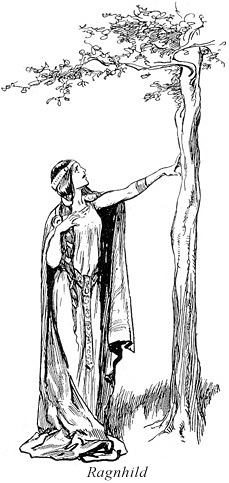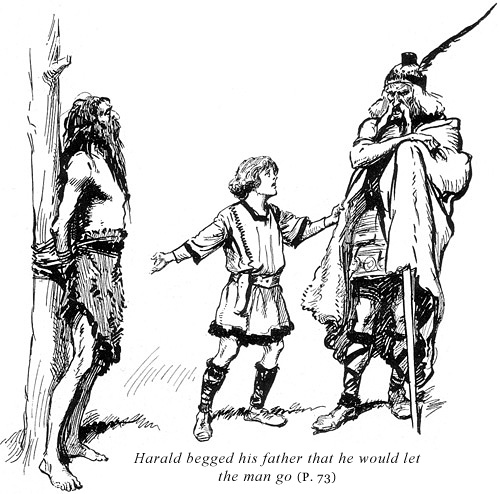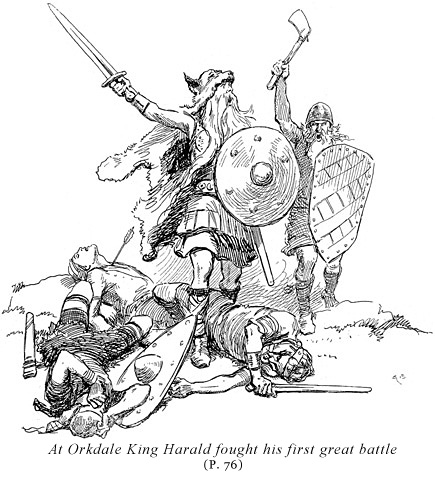|
THE STORY OF HARALD HAIRFAIR
King Harald Hairfair was the first King of all Norway. Before he conquered the land there were many kingdoms and many kings who were ever faring forth with their hosts to fight with each other. Halfdan the Black was the father of Harald, and the wise and mighty Queen Ragnhild was his mother. A great warrior was Halfdan, and much land was his in the south, and the south-east, and the south-west of the realm of Norway. Now Ragnhild was a dreamer of dreams, and once, soon after she was wedded to Halfdan the Black, she dreamed this dream. She thought she stood in her garden, and had a thorn in her fingers. While she looked upon it, it grew and grew till one end struck the earth, and rooted itself there, and the other end reared itself so high in the air that she could not see over its top. Wondrous great was the tree, with many goodly branches and limbs that spread, it seemed, all over Norway, and |
|
beyond it, and she saw that the lower part of the tree was red like blood: upward from thence it was fair and green, while at the top-most it was white. Long years after men knew the meaning of the dream, that it had foretold the power of Harald, the son that should be born to Halfdan and Ragnhild. His feats in war were foreshadowed in the blood-red trunk, his happy rule over his people in the fair green middle, and his old age and snow-white hair in the white top of the tree, while the many goodly branches were his descendants which were to spread all over Norway and beyond it. It was soon after Queen Ragnhild dreamed this dream that Harald was born, and Halfdan and she loved him with a great love and tended him well. Strong he grew, and fair; merry and wise withal, and brave even from his youthful days. Now it happened on a Yule-tide that King Halfdan sat at a feast with many men. But when they fain would have eaten, the goodly food and drink melted away before them. King Halfdan sat at the board, silent and grim, and his men, marvelling much, withdrew to their own homes. Then King Halfdan sent for a wise man and besought him that he would tell him the meaning of this thing, but the wise man spoke nought. Then the King, exceeding wroth, put torments upon him, yet still he spoke not, but to cry out for help on Harald. Then Harald, who was now nigh on ten winters old, begged of his father that he would let the man go free, but Halfdan listened not to his son’s prayers. |
|
But when time served, Harald himself set the man free, and went forth with him, and they journeyed along together. And at length they came to a place where there was a great feast.  And the lord of the feast gave them good welcome, and they abode with him many days. So the spring-tide fell, and on a day, the lord, who was wise in the knowledge of hidden things, called Harald to him and said: “Thy father is dead; go now thy ways home, and thou wilt get to thee all |
|
thy father’s lands, and hereafter thou shalt become the Lord of all Norway.” And Harald hastened back and found that it was even as it had been told him. King Halfdan was dead. So Harald took the kingdom, being now about ten years old. And the years passed and he waxed big and strong: the fairest of all men and the wisest and a great warrior. Now there was a certain maiden named Gyda, the daughter of King Eric of Hordaland. Exceeding fair she was, noble of mind, and virtuous. And because of these things King Harald would fain have her for his wife. So he sent messengers to the maiden and they came to her and told her their errand. But she answered them in some scorn, and looked upon them coldly while they spoke of their King’s worthiness and might, and of his widespread lands, till in their displeasure against her they would have carried her off by force. But this they dared not, so they arrayed them for returning and prepared to take leave. Then the Lady Gyda spake again to them in this wise: “Give this my word to King Harald, that only so will I say yea to being his wife if he twill first do so much for my sake as to lay under him all Norway; for only so meseems may he be called aright a King of the People.” And King Harald’s messengers fared back to him with this message of the maiden. And Harald saw their anger against her because of her words, and that they would fain have him force her to him, but he answered that she had not spoken ill but well. “For,” he said, “she has brought to my mind that matter |
|
which it now seems to me wondrous I have not had in my mind heretofore.” Then before them all he made an oath, saying, “This oath I make fast, and swear before that God who made me and rules over all things, that never more will I cut my hair, nor comb it, till I have gotten to me all Norway.” Well pleased were all to hear this oath, which they deemed right worthy of a king. Thereafter did Harald gather many men together, and northwards first they fared through the Dales, slaying and burning where any strove against them, but those that sought peace became the King’s men and fared along with him. At last they came to Orkdale, and here they fought their first great battle, and Harald won. And all the Orkdale folk and their King came to him in submission and he made them his men. And after that King Harald slew two kings at Gauldale, and took their realms to him; at Stiordale, too, he won a victory, and at Thrandheim, where there were eight kings, he overthrew them all. Farther north still he took to him the land of Naumdale, and then the winter coming on, he wended back to Thrandheim and abode there all the winter, and ever after he called it his home. Many mighty men now gathered round him, men who were great of heart and great of strength, and ready, for mighty feats; such only would he have about him. Many big ships he had, too, and now in the winter days his men made him another, bigger than any other he had and furnished in goodly wise. At |
|
the forepart was fashioned a great dragon’s head, and at the aft a dragon’s tail.  And when the spring came, King Harald made ready his men, and the great dragon ship and the other ships sailed out from Thrandheim. This time they turned south towards the lands called Northmere and Raumsdale. And Harald fought against the kings of those |
|
lands and they fell, and Harald put an earl over the lands to rule them, and himself sailed away back again to Thrandheim. And wherever he conquered Harald put an earl to rule in his name, and mighty grew these earls and rich because of the taxes which they got from the people. Now it was winter again, and Harald abode in Thrandheim till the spring came. Then he gathered a great host together, and brought his ships into the sea and fared forth again. And each spring did he thus till at last there was none to withstand him in all Norway. Many mighty men fled from before him, and they took ships and went over the sea and peopled the islands of the Faroes, and the island of Iceland; but many other mighty men came to him, and did him fealty and became his men. And now that King Harald was at last the King of all Norway he remembered him of the wise maiden, Gyda, and the words that she had spoken which had roused him to go forth in great heart, and had strengthened him with the hope of such rich reward. And he called men unto him and sent them forth to her again, desiring her to return with them, and share his glory and his throne. And this time Gyda smiled upon them, and answered them with gracious words. And she arrayed herself in rich garments, and they brought her to Harald. Glad he was in her beauty as he had been in her wisdom, and he made a great feast, and they were wedded. But although King Harald was now Lord over all Norway, there was not yet peace in the land. |
|
Vikings from west over the sea harried the country far and wide. Ever as Harald descended upon them, they fled from him in their ships. And the King was sore vexed. Till at last on a summer he gathered his host together, and sailed away to the lands west over the sea, to seek the Vikings on their own ground. First he came to the Shetland Islands, and there he slew all the Vikings that could not flee from him. Then on he fared, sailing now south to the Orkneys, and there, too, the Vikings fell before his wrath. One again he went to the South Isles, as they called the islands lying off the coast of Scotland, then to Scotland itself, and ever the victory fell to Harald. And now the fighting being done, and quiet restored, King Harald sailed home to Norway. And on a day there was great feasting in the hall of Earl Rognvald, who ruled over the Mere-folk. Splendid was the feast, for Rognvald was a mighty earl, and King Harald was his guest. And seeing that his vow to conquer all Norway was accomplished, King Harald bathed, and he let his hair be combed, and Earl Rognvald himself did cut it. Before this time it had been neither combed nor cut for ten years, for so long had the performance of his vow held him, and his hair being grown exceeding long and thick and tangled, men called him Harald Shockhead. But now they gave him a new name, Harald Hairfair, so bright and goodly were his locks, and ever after was he thus known. And many winters passed, so peaceful and plenteous that all men rejoiced in them, and in the wise rule of their King which had brought such happy days. But |
|
now it happened on a day at Yule-tide that King Harald went a-guesting in the Uplands. And on the Yule-eve, as he sat at meat, there cometh to his door one Swasi, a Finn. And Swasi sent a messenger to the King desiring that he will come to him. And the King waxed exceeding wroth at the message and returned angry answer by the messenger. But Swasi would not be denied, but bade that the message be again carried to the King, who, he said, had not long since granted him as a boon that he might set up his cot in that land. At this the King rose and went out to the Finn, who now begs him to fare home with him. And though many of his men would have hindered his going, Harald answered him yea, and went forth with him. And when they reached the cot, and entered it, there sat Snowfair, the daughter of Swasi, and the fairest of all women was she. And she rose to meet the King, and King Harald’s eyes lingered long on her wondrous beauty. Then she brought to him a cup of honey mead, and the King took it from her, and held for a moment the white hand that bore it. And straight way he loved her and desired to wed her, for kings in those days might wed as many wives as they chose. And Swasi the Finn seemed not over eager for the match, yet in the end consented, and King Harald made Snowfair his wife. And they abode in that place, and with such love did Harald love Snowfair, that he was ever at her side, and he thought no more upon his kingdom, and his people, or of his kingly honour and duty. And the years passed and the people waited |
|
and waited for his coming and sorrowed ever as he came not. But at length Snowfair died, and now men thought that surely the mighty Harald of old would return to them. But even as love had held him, now grief held him still. Snowfair lay upon her bed as fair as when she was alive, the red and white as fresh upon her cheek as when he had first beheld her. And Herald sat by her side and watched her, and in his heart he deemed that she still lived. So none dared to prepare the fire for her body, as was the custom in those days, and three more winters came and went, and hope died in the hearts of the people. But now arose Thorlief the Sage, a wise and noble man, who had known Harald all his life, and been held in high honour by Harald’s father, Halfdan the Black. Thorlief bethought him that he would go unto the King and see what could be done to turn him from his beguilement. And he came to the King where he sat beside the still form of Snowfair. And Thorlief looked upon her and marvelled at her beauty, yet presently he saw a way to the King’s restoration. He spoke soft words to Harald, saying that it was no wonder that he should thus honour the fair dead with long watching, with rich raiment, and soft pillows and goodly coverings, but in his grief he had not observed that their freshness had faded, and that it was needful for her honour that the linen and coverings should be changed and kept as fair and fresh as she herself. And the words pleased King Harald, and he called women to him and bade them array Snowfair in new |
|
raiment and cover her with clean linen. But when they raised her in her bed, there arose evil smells and rottenness, so that in all haste they kindled the balefire (as the fire for the burning of the dead was called) and gave her body to the flames. And lo, all her freshness faded and all the red and white became of a sudden blue and hideous to the sight, and from her crawled worms and frogs and all manner of loathsome creeping things. And they burnt her to ashes. And the King sat long alone, and thought over all these happenings, and of his many years of forgetfulness of his people and his country. And his mind was turned to them again, and he grieved over his wrong-doing, for he knew now by the signs that had been given him that Swasi the Finn and Snowfair had beguiled him by magic art. So he thrust the thought of Snowfair from his mind as of an evil thing that had sought his ruin, and he rose and went among his people and ruled them once more with wisdom. And his people were glad in him, and he in them, and again the land prospered and there was peace. Now Harald had many sons, and as the years sped on and they grew to manhood, full discontented they were that their father had given them no lordship in the country, but had given it instead to earls who were not of kinship with him. And they fought against the King’s earls, and some they killed, and some they drove forth from their lands. Yet did not the brothers hold together, but quarrelled much among themselves. Sorely grieved was King Harald at them, and at |
|
last he was minded to call together a Thing, or assembly of the people in council, to talk over the matter with him. And when the Thing was met, King Harald made known his will that all his sons should take the name of king, and a portion of the land to rule over in place of the earls. He himself was still to be King over all, and to keep his right to sit in the high seat, they sitting always a step lower than himself, and a step higher than others of noble degree. Even now were they not satisfied, but each one waited for the time when King Harald should die, thinking to sit in the high seat himself, and be king over all, but King Harald was minded that his son, Eric, whom he loved the most of all his sons, should have it. And in spite of much quarrelling over the matter, when Harald was eighty years old, and found himself burdened by age, he took Eric by the hand and led him to the high seat, and gave him rule over all Norway. And three years after Harald died. It had been the custom to burn the bodies of the dead in the bale-fire, but, in accordance with a new custom which was gaining favour at that time, Harald was laid beneath a hove or mound. Thus ended Harald Hairfair, the first King of all Norway, who long lived in men’s minds as the fairest, the strongest, the bravest, and the friendliest of all men. |

|

|

|